Personal Files Book 1, 6 January - 31 January 1915, Part 1
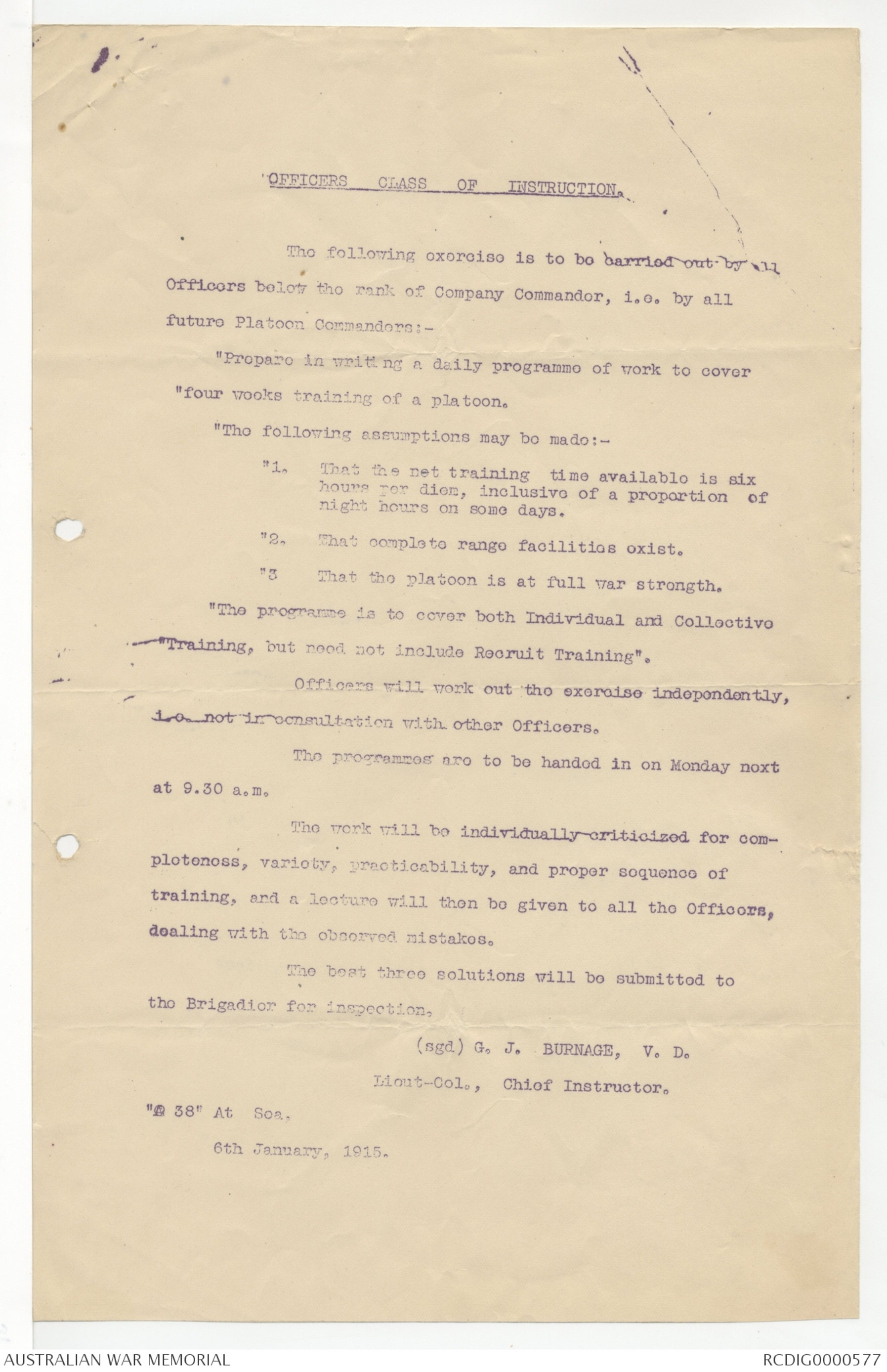
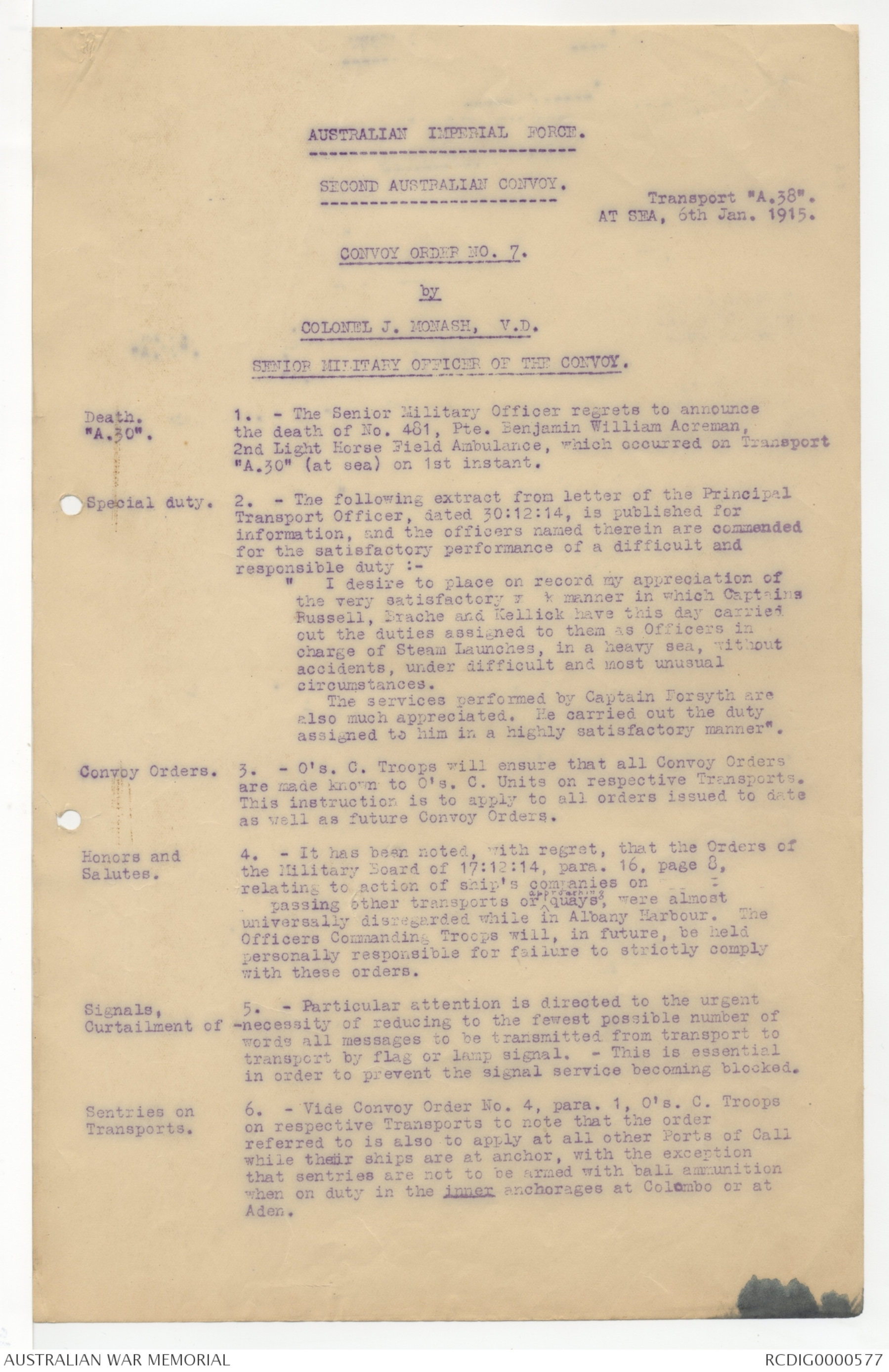
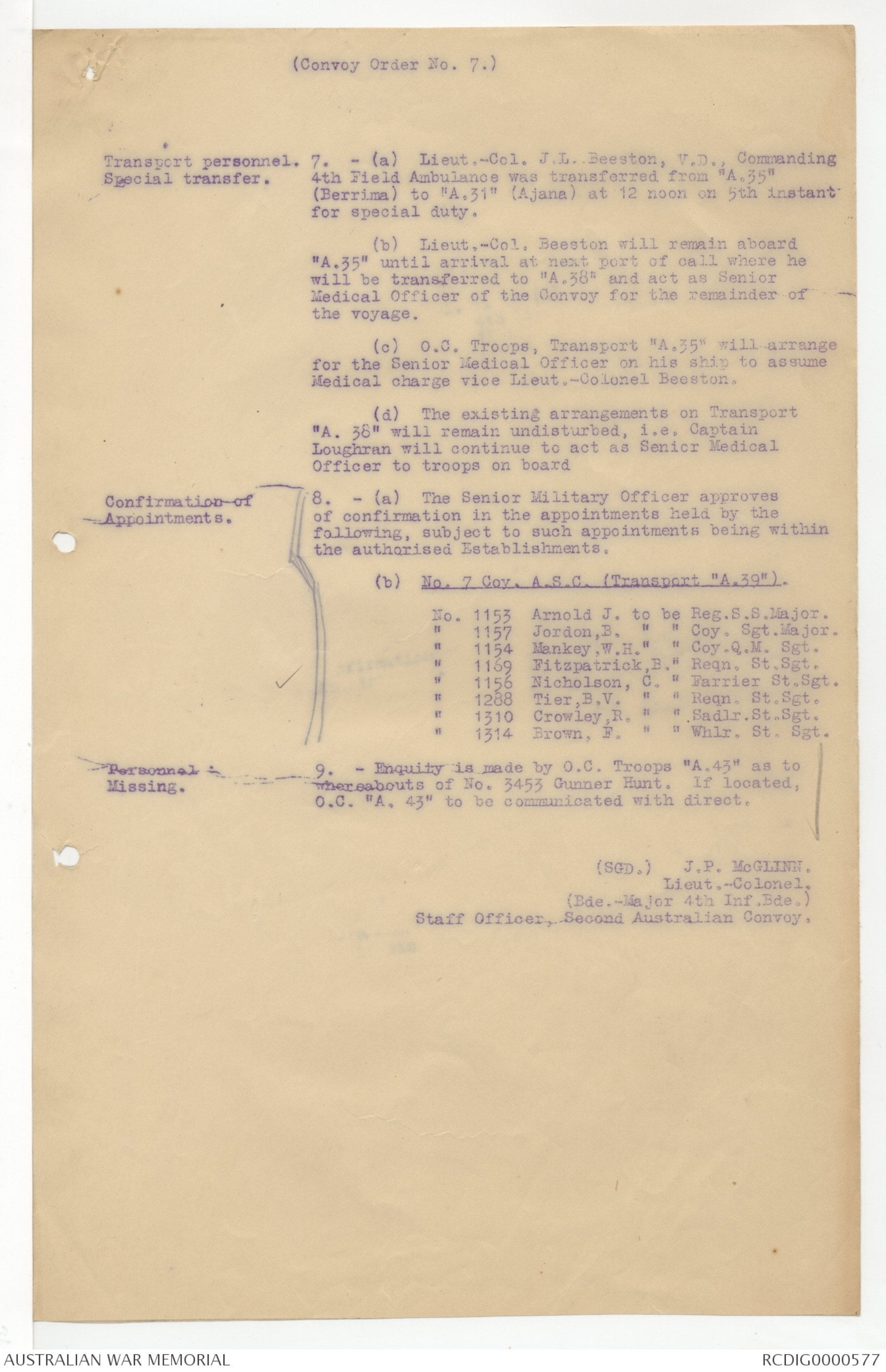
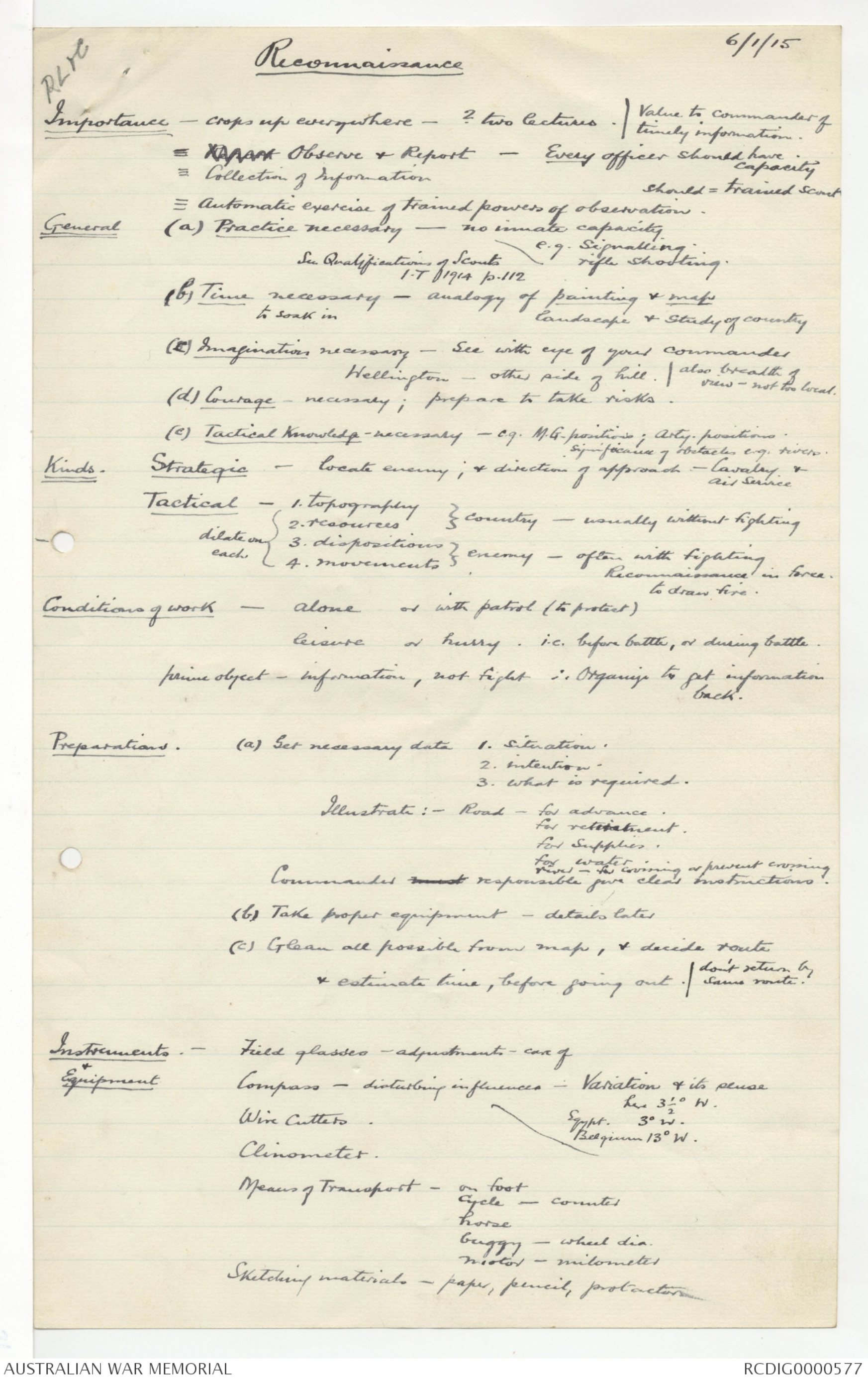
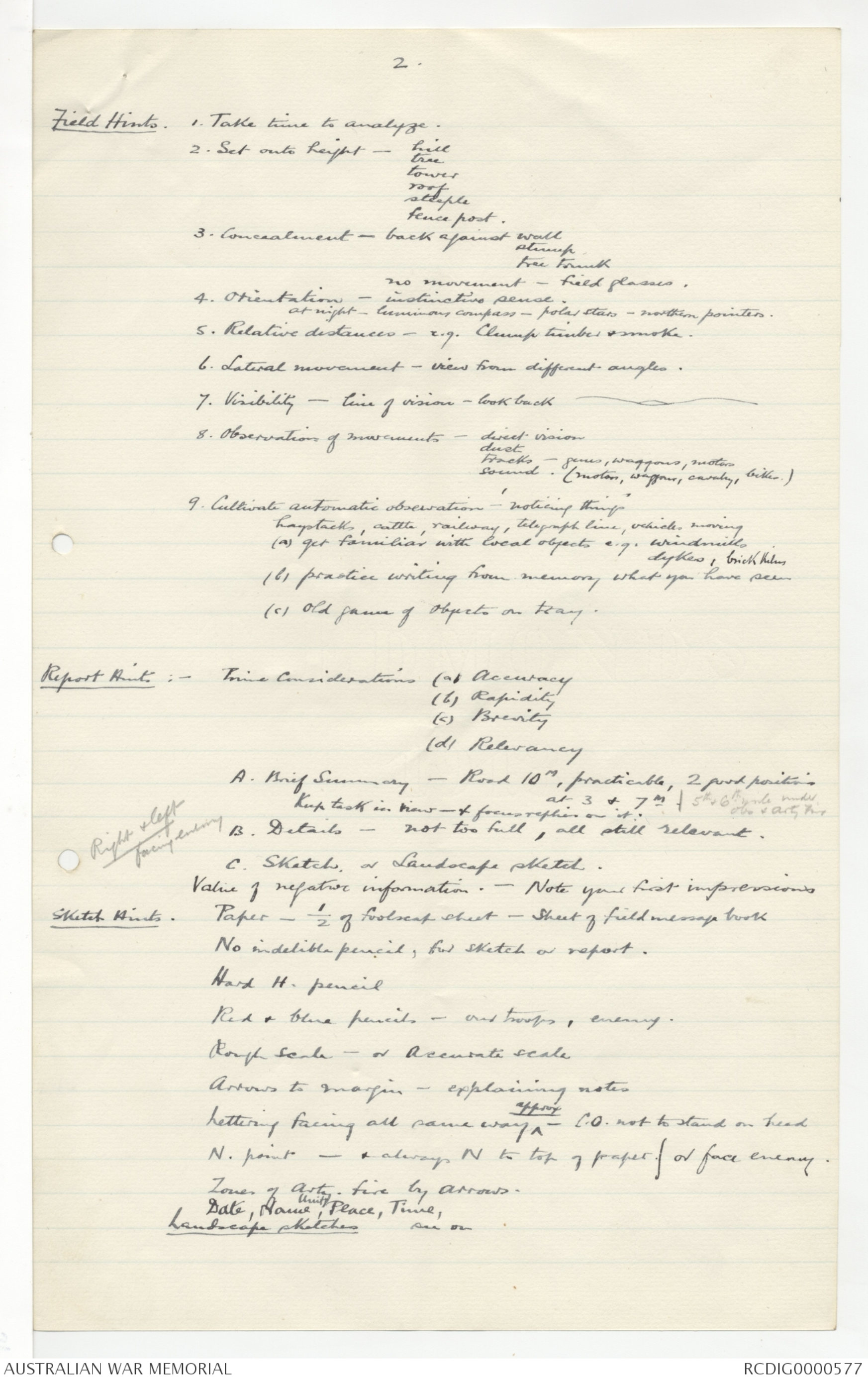
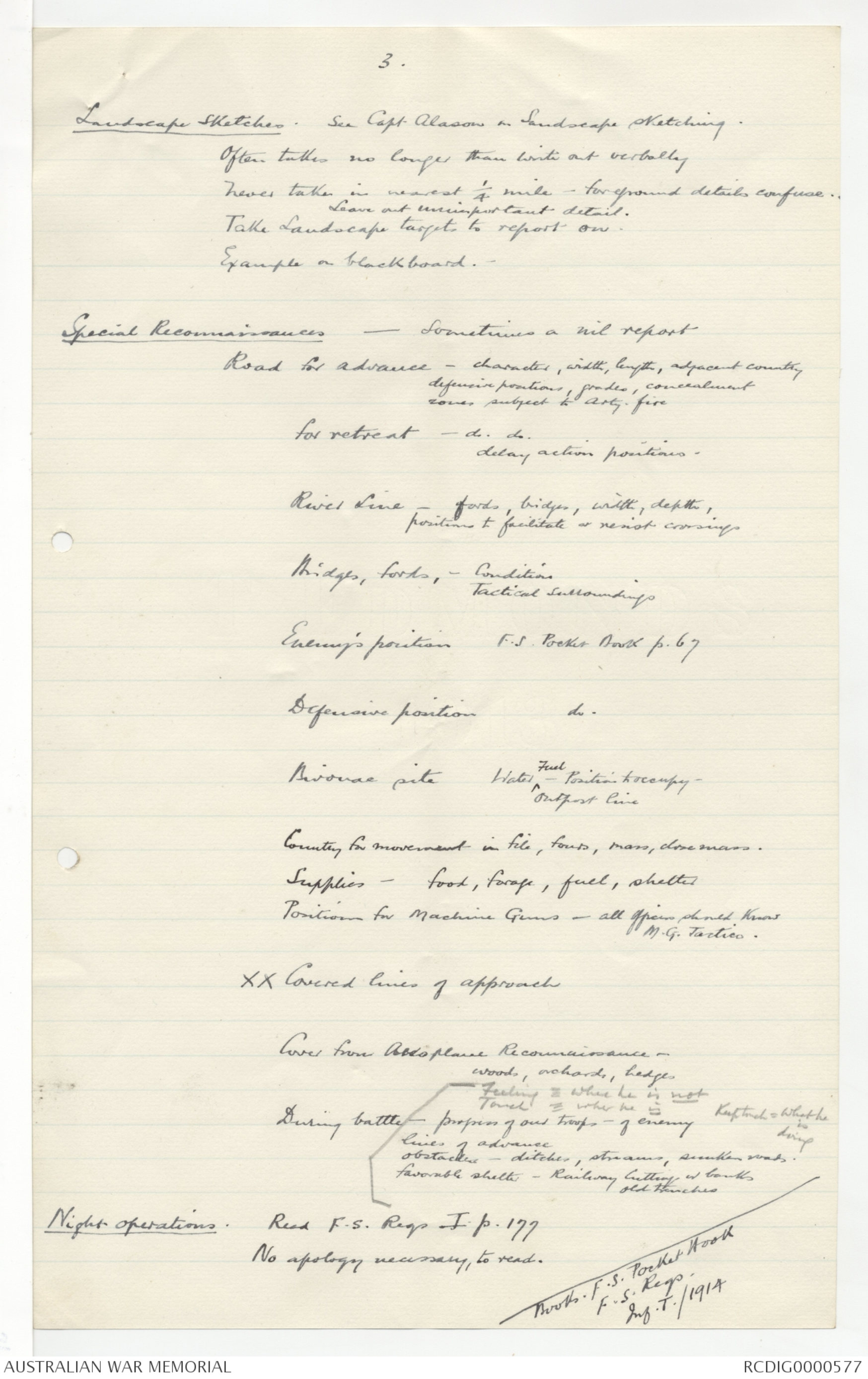
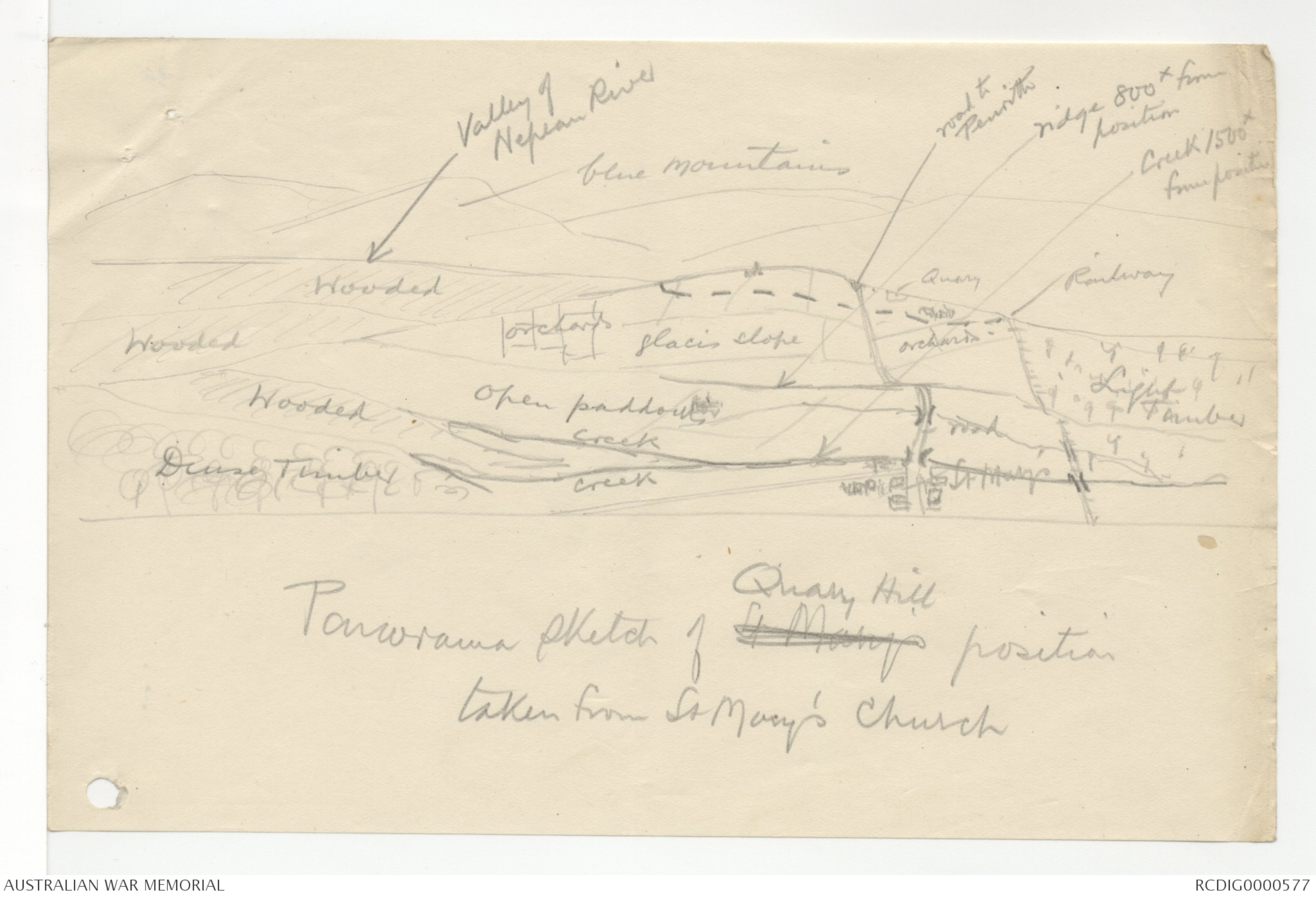
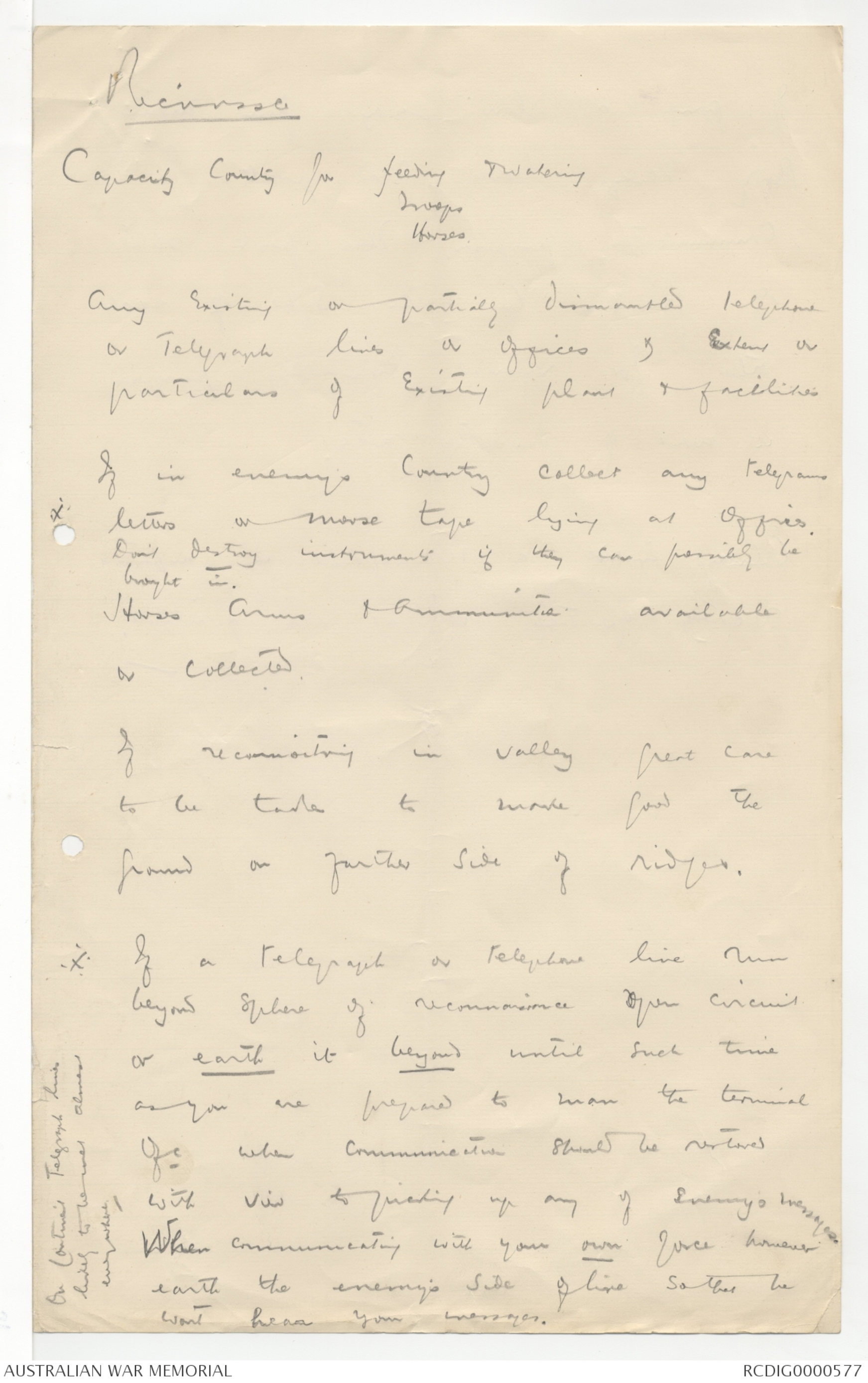
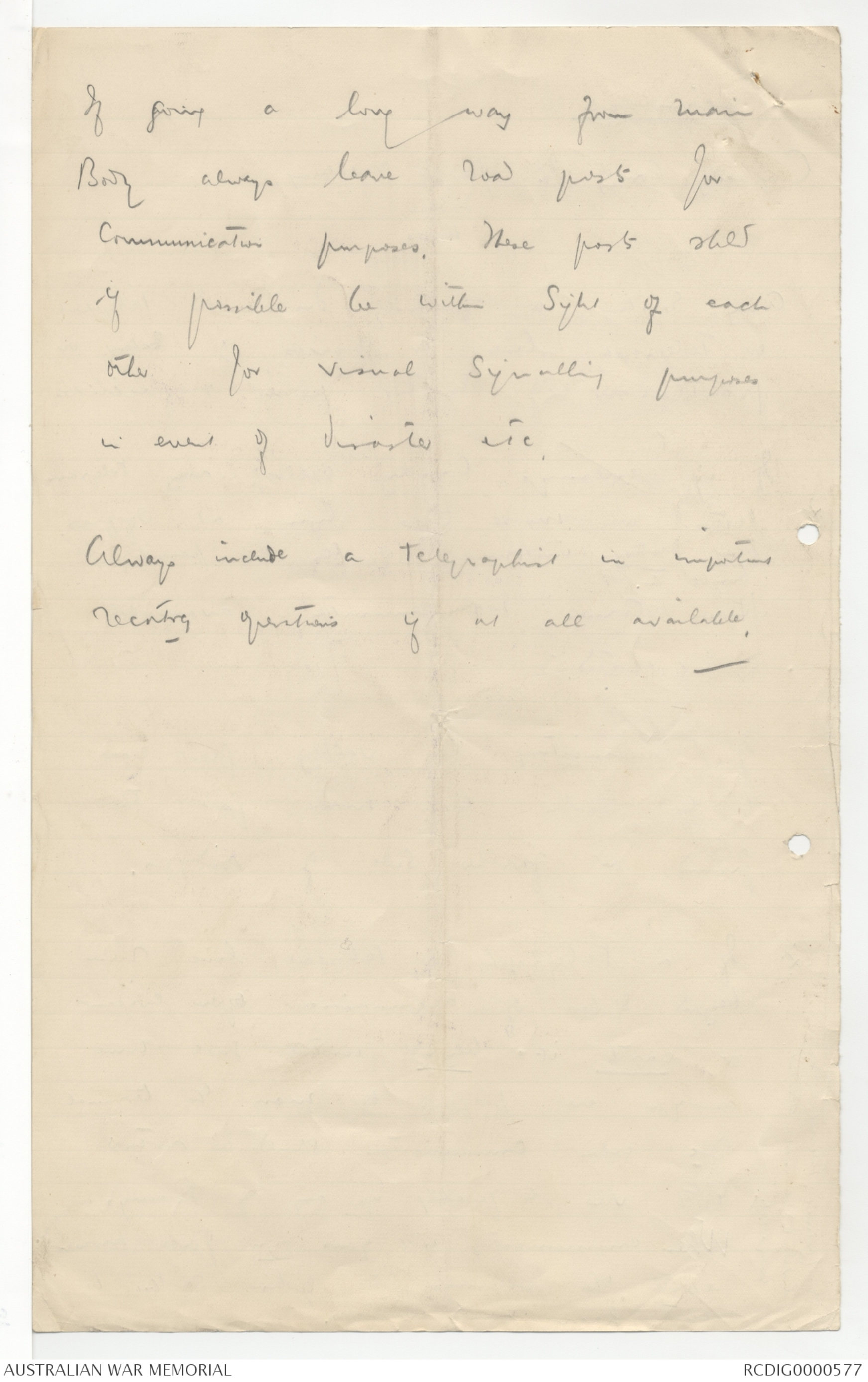
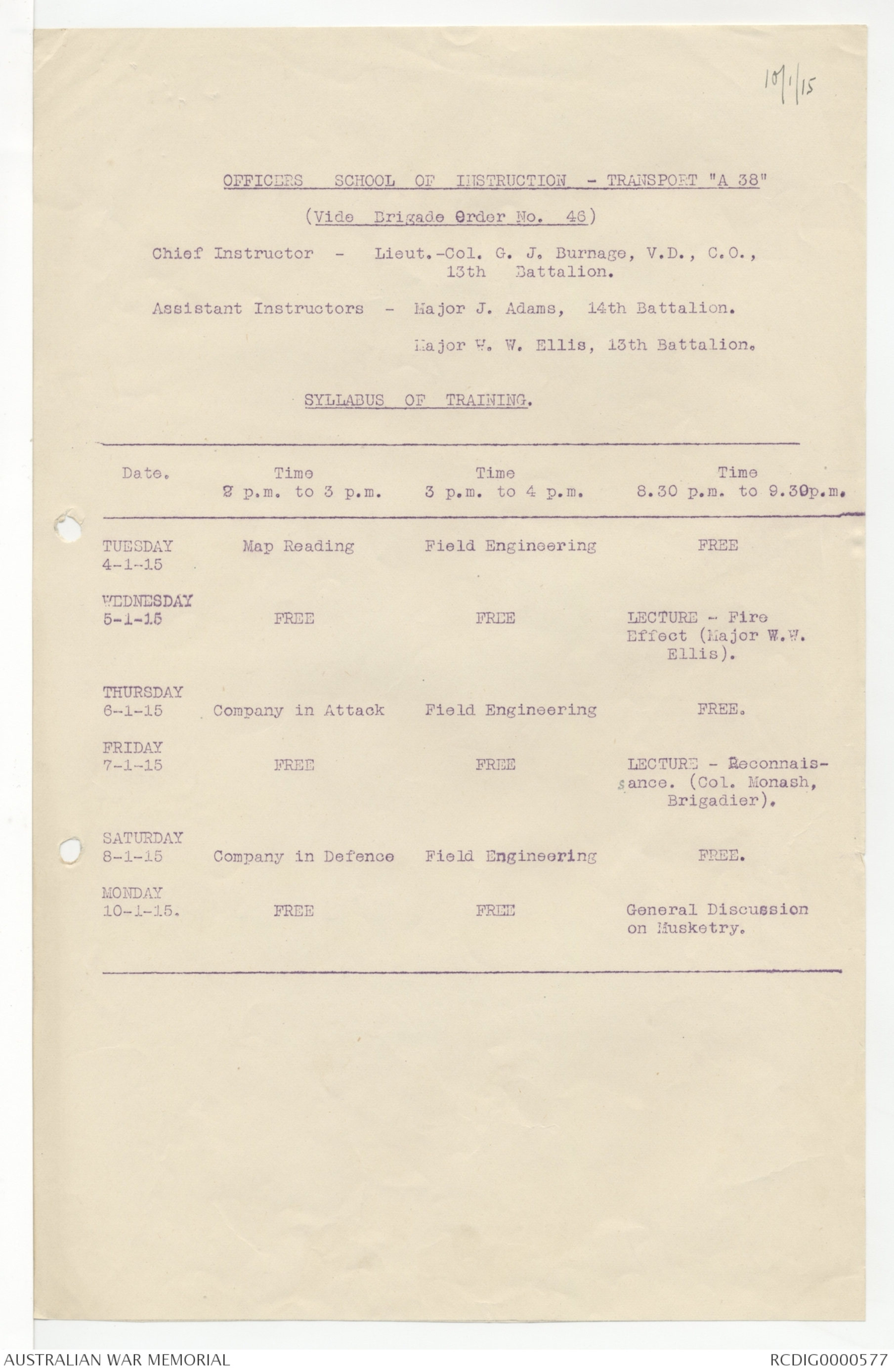
OFFICERS CLASS OF INSTRUCTION
The following exercise is to be carried out by all
Officers below the rank of Company Commander, i.e. by all
future Platoon Commanders:-
"Prepare in writing a daily programme of work to cover
"four weeks training of a platoon.
"The following assumptions may be made:-
"1. That the net training time available is six
hours per diem, inclusive of a proportion of
night hours on some days.
"2. That complete range facilities exist.
"3. That the platoon is at full war strength.
"The programme is to cover both Individual and Collective
"Training, but need not include Recruit Training".
Officers will work out the exercise independently,
i. e. not in consultation with other Officers.
The programmes are to be handed in on Monday next
at 9.30 a.m.
The work will be individually criticized for completeness,
variety, practicability, and proper sequence of
training, and a lecture will then be given to all the Officers,
dealing with the observed mistakes.
The best three solutions will be submitted to
the Brigadier for inspection,
(sgd) G. J. BURNAGE, V.D.
Lieut-Col., Chief Instructor,
"A 38" At Sea,
6th January, 1915.
AUSTRALIAN IMPERIAL FORCE.
SECOND AUSTRALIAN CONVOY.
Transport "A.38"
AT SEA, 6th Jan. 1915.
CONVOY ORDER NO. 7
by
COLONEL J. MONASH, V.D.
SENIOR MILITARY OFFICER OF THE CONVOY.
Death. 1. -The Senior Military Officer regrets to announce
"A.30". the death of No. 481, Pte. Benjamin William Acreman,
2nd Light Horse Field Ambulance, which occurred on Transport
"A.30" (at sea) on 1st instant.
Special duty. 2. - The following extract from letter of the Principal
Transport Officer, dated 30:12:14, is published for
information, and the officers named therein are commended
for the satisfactory performance of a difficult and
responsible duty:-
" I desire to place on record my appreciation of
the very satisfactory [[w?k]] manner in which Captain
Russell, Brache and Kellick have this day carried
out the duties assigned to them as Officers in
charge of Steam Launches, in a heavy sea, without
accidents, under difficult and most unusual
circumstances.
The services performed by Captain Forsyth are
also much appreciated. He carried out the duty
assigned to him in a highly satisfactory manner".
Convoy Orders. 3. -O's. C. troops will ensure that all Convoy Orders
are made known to O's. C. Units on respective Transports.
This instruction is to apply to all orders issued to date
as well as future Convoy Orders.
Honors and 4. - It has been noted, with regret, that the Orders of
Salutes the Military Board of 17:12:14, para. 16, page 8,
relating to action of ship's companies on
passing other transports or ^approaching quays, were almost
universally disregarded while in Albany Harbour. The
Officers Commanding Troops will, in future, will be held
personally responsible for failure to strictly comply
with these orders.
Signals 5. - Particular attention is directed to the urgent
Curtailment of -necessity of reducing to the fewest possible number of
words all messages to be transmitted from transport to
transport by flag or lamp signal. - This is essential
in order to prevent the signal service becoming blocked.
Sentries on 6. - Vide Convoy Order No. 4, para. 1, O's. C. Troops
Transports on respective Transports to note that the order
referred to is also to apply at all other Ports of Call
while their ships are at anchor, with the exception
that sentries are not to be armed with ball ammunition
when on duty in the inner anchorages at Colombo or at
Aden.
(Convoy Order No. 7.)
Transport personnel. 7. - (a) Lieut-Col. J.L.Beeston, V.B., Commanding
Special Transfer. 4th Field Ambulance was transferred from "A.35"
(Berrima) to "A.32" (Ajana) at 12 noon on 5th instant
for special duty.
(b) Lieut-Col. Beeston will remain aboard
"A.35" until arrival at next port of call where he
will be transferred to "A.38" and act as Senior
Medical Officer of the Convoy for the remainder of
the voyage.
(c) O.C. Troops, Transport "A.35" will arrange
for the Senior Medical Officer on his ship to assume
Medical charge vice Lieut.-Colonel Beeston.
(d) The existing arrangements on Transport
"A.38' will remain undisturbed, i. e, Captain
Loughran will continue to act as Senior Medical
Officer to troops on board
Confirmation of 8. - (a) The Senior Military Officer approves
Appointments of confirmation in the appointments held by the
following, subject to such appointments being within
the authorised Establishments.
(b) No. 7 Coy. A.S.C. (Transport "A.39")
No. 1153 Arnold J. to be Reg. S.S. Major.
" 1157 Jordon, B. " " Coy. Sgt. Major.
" 1154 Mankey, W.H " " Coy. Q.M. Sgt
" 1169 Fitzpatrick, B " Reqn. St. Sgt.
" 1156 Nicholson, C. " Farrier St. Sgt.
" 1288 Tier , B.V. " " Reqn. St, Sgt,
" 1310 Crowley, R, " " Sadlr, St. Sgt,
" 1314 Brown, F. " " Whlr, St. Sgt.
Personnel 9. - Enquity is made by G.C. Troops "A.43" as to
Missing whereabouts of No. 3455 Gunner Hunt. If located,
G.C. "A.43" to be communicated with direct.
(SGD.) J.F. McGLINN
Lieut.-Colonel,
(Bde.- Major 4th Inf. Bde.)
Staff Officer, Second Australian Convoy.
RL&C Reconnaissance 6/1/15
___________________
Importance - crops up everywhere - ? two lectures | Value to commander of
timely information
= Report Observe & Report - Every officer should have
capacity
= Collection of Information should = trained scout
= Automatic exercise of trained powers of observation.
General (a) Practice necessary - no innate capacity e.g. signalling
rifle shooting.
See Qualification of Scouts
I.T 1914 p.112
(b) Time necessary - analogy of painting & maps
to soak in landscape & study of country
(c) Imagination necessary - See with eye of your Commander
\ also breadth of
view- not too local
Wellington - other side of hill.
(d) Courage - necessary; prepare to take risks.
(e) Tactical knowledge - necessary - eg. M.G - positions; Arty. positions.
significance of obstacles e.g. river.
Kinds. Strategic - locate enemy; & direction of approach - Cavalry &
Air Service
Tactical - 1. topography}
2. resources } country - usually without fighting
dilate on { 3. disposition }
each { 4. movements } enemy - often with fighting
Reconnaissance in force
to draw fire.
Conditions of work - alone or with patrol (to protect)
leisure or hurry . i.e. before battle, or during battle
prime object - information, not fight Organize to get information
back.
Preparations. (a) Set necessary data 1. situation.
2. intention.
3. what is required.
Illustrate: - Road - for advance.
for [[retirement ?]].
for supplies
for water
river - for crossing or prevent crossing
Commander must responsible give clear instructions.
(b) Take proper equipment - details later
(c) Glean all possible from maps, & decide route
don't return by
same route.
& estimate time, before going out.
Instruments - Field glasses - adjustments - care of
&
Equipment Compass - disturbing influence - Variation & its sense
hrs 3½o W.
Egypt 3o W.
Belgium 13o W.
Wire cutters.
Clinometer.
Means of Transport - on foot
Cycle - counter
horse
buggy - wheel dia.
motor - milometer
Sketching materials - paper, pencil, protractor
2.
Field Hints. 1. Take time to analyze.
2. Set onto height - hill
trees
tower
roof
steeple
fence post.
3. Concealment - back against wall
stump
tree trunk
no movement - field glasses
4. Orientation - instinctive sense.
at night - luminous compass - polar stars - northern pointers
5. Relative distances - e.g clump timber & smoke
6. Lateral movement - view from different angles.
7. Visibility - line of vision - look back
8. Observation of movement - direct vision
dust
tracks - guns, waggons, motors
sound. (motors, waggons, cavalry, bikes)
9. Cultivate automatic observation 'noticing things'
haystacks, cattle, railway, telegraph line, vehicles moving
(a) get familiar with local objects e.g. windmills,
dykes, brick kilns
(b) practice writing from memory what you have seen
(c) old game of objects on tray.
Report Hints:- Time consideration (a) Accuracy
(b) Rapidity
(c) Brevity
(d) Relevancy
A. Brief Summary - Road 10M, practicable, 2 good positions
at 3 & 7M.l 5th & 6th units under
obs & Arty fire
keep task in view - & focus replies on it
Right & left
facing enemy
B. Details - not too full, all still relevant
C. Sketch. on Landscape sketch
Value of negative information. - Note your first impression
Sketch Hints. Paper - ½ of foolscap sheet - Sheet of field message book
No indelible pencil, for sketch or report.
Hard H. pencil
Red & blue pencils - our troops , enemy
Rough scale - or accurate scale
Arrows to margin - explaining notes
Lettering facing all same way approx - C.O not to stand on head
N. point - & always N to top of paper l or face enemy
Zones of Arty. fire by arrows.
Date, Name, Unit, Place, Time,
Landscape sketches see on
3.
Landscape Sketches - See Capt Alason re Landscape Sketching.
Often takes no longer than write out verbally
Never taken in nearest ¼ mile - foreground details confuse..
Leave out unimportant detail.
Take Landscape targets to report on.
Example on blackboard.
Special Reconnaisances - Sometimes a nil report
Road for advance - character, width, length, adjacent country
defensive positions, grade, concealment
zone subject to Arty. fire
for retreat - do. do.
delay action positions
River Line - fords, bridges, width, depth,
positions to facilitate or resist crossings
Bridges, fords, - Conditions
Tactical surroundings
Enemy's positions F.S Pocket Book p. 67
Defensive position do.
Bivouac site Water Fuel Position to occupy
Outpost line
Country for movement in file, fours, mass, close mass.
Supplies - Food, forage, fuel, shelter
Positions for Machine Guns - all officers should know
M.G. Tactics.
XX Covered lines of approach
Cover from Aeroplane Reconnaisance -
woods, orchards, hedges
Feeling = where he is not
Touch = where he is Keep touch = What he
is
doing
During battle - progress of our troops - of enemy
lines of advance
obstacles - ditches, streams, sunken roads.
favourable shelter - Railway cuttings or banks
old trenches
Night operations. Read F.S Regs 1 p. 177
No apology necessary, to read.
______________________________________
Books. F.S. Pocket Book
F.S. Regs.
Inf.T./1914
Panorama sketch of St Marys Quarry Hill position
Taken from St Mary's Church.
[[Reconesse?]]
Capacity Country for feeding & watering
Troops
Horses
Any Existing or partially dismantled telephone
or telegraph lines or offices & Extent or
particulars of existing plant & facilities
If in enemies country collect any telegrams
X letters or morse tape lying at offices
Don't destroy instruments if they can possibly be
brought in.
Horses, Arms & Ammunition available
or collected.
If reconnoitring in valley great care
to be taken to make for the
ground on farther side of ridges.
X If a telegraph or telephone line runs
beyond sphere of reconnaisance open circuit
or earth it beyond until such time
as you are prepared to man the terminal
[[Ofc?]] when communication should be returned
with view to picking up any of enemies messages.
When communicating with your own force however
earth the enemy's side of line so that
he wont hear your messages.
{* On contained telegraph lines
linking to the war almost
everywhere*}
If going a long way from main
Body always leave dual posts for
communication purposes. These posts shall
if possible be within sight of each
other for visual signalling purposes
in event of disaster etc.
Always include a Telegraphist in important
recontng operations if at all available.
10/1/15
OFFICERS SCHOOL OF INSTRUCTION - TRANSPORT "A 38"
(Vide Brigade Order No. 46)
Chief Instructor - Lieut.-Col. G. J. Burnage, V,D., C.O.,
13th Battalion.
Assistant Instructors - Major J. Adams, 14th Battalion
Major W. W. Ellis, 13th Battalion.
SYLLABUS OF TRAINING.
----------------------------------------------------------------------------------------
Date. Time Time Time
2 p.m. to 3 p.m. 3 p.m. to 4 p.m. 8.30p.m. to 9.30 p.m.
----------------------------------------------------------------------------------------
TUESDAY Map Reading Field Engineering FREE.
4-1-15
WEDNESDAY
5-1-15 FREE FREE LECTURE-Fire
Effect (Major W. W.
Ellis).
THURSDAY
6-1-15 Company in Attack Field Engineering FREE.
FRIDAY
7-1-15 FREE FREE LECTURE- Reconnais-
sance. (Col. Monash,
Brigadier).
SATURDAY
8-1-15 Company in Defence Field Engineering FREE.
MONDAY
10-1-15 FREE FREE General Discussion
on Musketry.
---------------------------------------------------------------------------------------
 Jacqueline Kennedy
Jacqueline KennedyThis transcription item is now locked to you for editing. To release the lock either Save your changes or Cancel.
This lock will be automatically released after 60 minutes of inactivity.